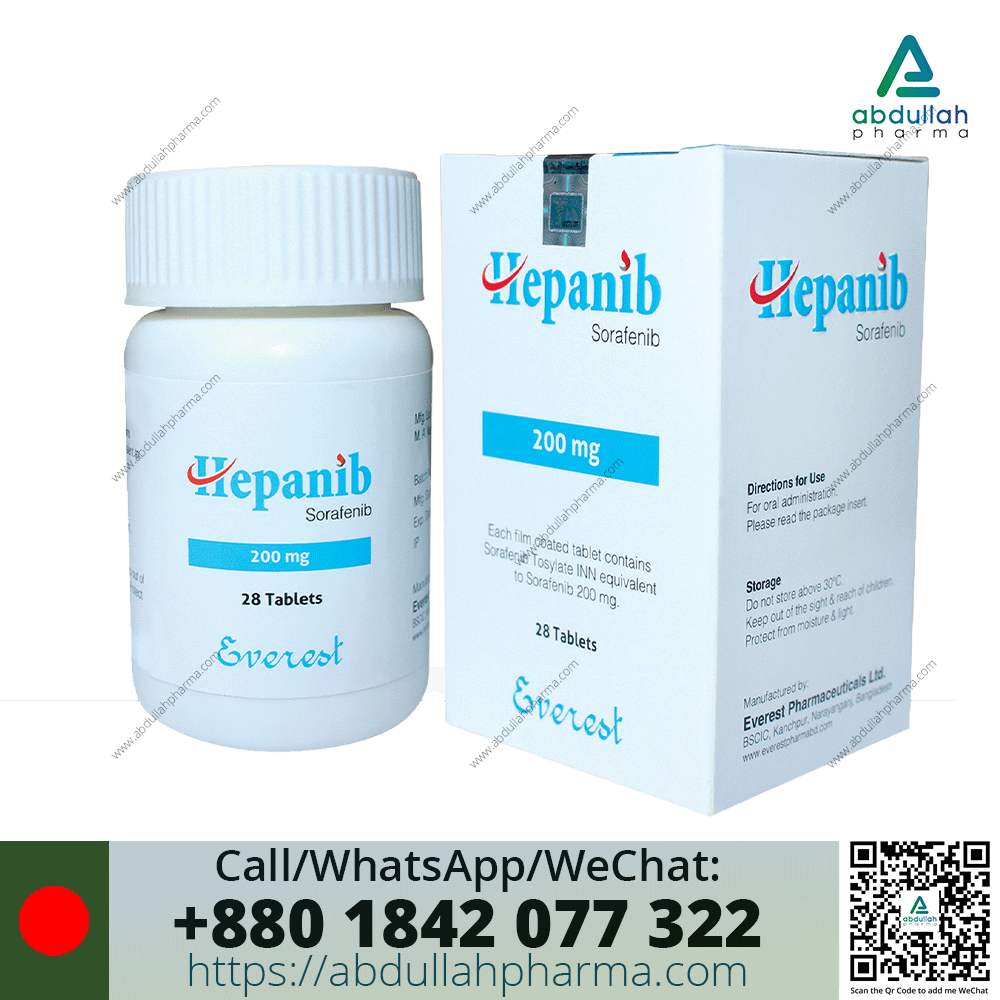Hepanib Tablet
Sorafenib Tosylate
200 mg
Everest Pharmaceuticals Ltd.
Indications
Hepatocellular Carcinoma: Sorafenib is indicated for the treatment of patients with unresectable hepatocellular carcinoma (HCC).
Renal Cell Carcinoma: Sorafenib is indicated for the treatment of patients with advanced renal cell carcinoma (RCC).
Therapeutic Class
Targeted Cancer Therapy
Pharmacology
Sorafenib is a kinase inhibitor that decreases tumor cell proliferation in vitro. Sorafenib was shown to inhibit multiple intracellular (CRAF, BRAF and mutant BRAF) and cell surface kinases (KIT, FLT-3, RET, VEGFR-1, VEGFR-2, VEGFR-3, and PDGFR-ß). Several of these kinases are thought to be involved in tumor cell signaling, angiogenesis, and apoptosis. Sorafenib inhibited tumor growth and angiogenesis of human hepatocellular carcinoma and renal cell carcinoma, and several other human tumor xenografts in immunocompromised mice.
Dosage
Advanced renal cell carcinoma: 400 mg bid. May continue until patient is no longer responding or unacceptable toxicity occurs.
Hepatic Impairment: No safety data is available for use in patients with Child-Pugh C hepatic impairment.
Administration
Should be taken on an empty stomach. May be taken with a low or moderate fat meal. If the patient intends to have a high fat meal, sorafenib should be taken on an empty stomach at least 1 hr before or 2 hr after meals. Swallow whole, do not chew/crush.
Interaction
Inducers of isoenzyme CYP3A4 e.g. carbamazepine, dexamethasone, phenobarbital, phenytoin, rifampicin may decrease sorafenib plasma concentration. Coadmin with sorafenib may increase the plasma concentration of doxorubicin and irinotecan.
Contraindications
Sorafenib is contraindicated in patients with known severe hypersensitivity to sorafenib or any other component of Sorafenib. Sorafenib in combination with carboplatin and paclitaxel is contraindicated in patients with squamous cell lung cancer
Side Effects
Rash and hand-foot skin reactions. Hypophosphataemia, hypertension, bleeding, tinnitus, depression and erectile dysfunction. Alopecia, pruritus, dry skin, erythema, acne, flushing, exfoliative dermatitis, hoarseness, GI disturbances, arthralgia, myalgia, asthenia, pain and peripheral neuropathy.
Pregnancy & Lactation
Pregnancy category D There is positive evidence of human foetal risk, but the benefits from use in pregnant women may be acceptable despite the risk (e.g., if the drug is needed in a life-threatening situation or for a serious disease for which safer drugs cannot be used or are ineffective).
Precautions & Warnings
Interrupt teatment if patient develops cardiac infarction, ischaemia and/or bleeding fatalities. Regular monitoring of BP, CBC and platelet is recommended. Monitor INR in patients who are on treatment with warfarin. Adequate contraception should be used during and for at least 2 wk after stopping treatment. May need to discontinue treatment if severe or persistent hypertension occurs.
Overdose Effects
There is no specific treatment for Sorafenib overdose. The highest dose of Sorafenib studied clinically is 800 mg twice daily. The adverse reactions observed at this dose were primarily diarrhea and dermatologic. No information is available on symptoms of acute overdose in animals because of the saturation of absorption in oral acute toxicity studies conducted in animals. In cases of suspected overdose, Sorafenib should be withheld and supportive care instituted.
Storage Conditions
Store at 25° C.
/*54745756836*/













Reviews
There are no reviews yet.